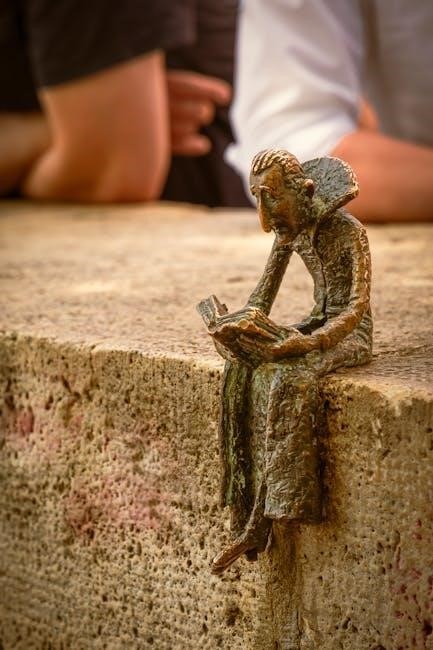Jon J. Muth’s Stone Soup reimagines the classic folktale in a Chinese village, where three monks teach generosity. Beautiful watercolor illustrations and a heartfelt story. Available as a PDF, this timeless tale emphasizes community and sharing.
Overview of the Book
Stone Soup by Jon J. Muth is a charming retelling of the classic folktale, set in a Chinese village. Three monks arrive during a time of hardship and teach the villagers the value of generosity and community by creating a delicious soup from stones. Muth’s watercolor illustrations bring the story to life, blending cultural elements with universal themes. The book is widely available in PDF format, making it accessible for readers worldwide. Its uplifting message and stunning visuals have made it a beloved choice for both children and adults, fostering empathy and cooperation.
Importance of the Story in Modern Context
Stone Soup remains a timeless tale with profound relevance today. Its themes of generosity, community, and overcoming suspicion resonate deeply in a world often divided by fear and isolation. Muth’s adaptation, set in a war-torn Chinese village, highlights the universal human need for connection and cooperation. The story encourages readers to look beyond their differences and embrace the transformative power of sharing. This message is especially vital for children, teaching them empathy and the value of collective effort. The book’s modern retelling ensures its legacy endures, inspiring a new generation to build stronger, more compassionate communities.
Availability of the Book in PDF Format
Stone Soup by Jon J. Muth is widely available in PDF format, making it accessible to readers worldwide. The digital version can be downloaded from platforms like Amazon Kindle, ensuring convenience and portability. This format allows educators and parents to easily incorporate the story into lessons or bedtime routines. With its vibrant illustrations and poignant message, the PDF version retains the charm of the physical book while offering modern accessibility. Readers can enjoy the story on various devices, making it a versatile choice for both personal and educational use.

The Author and His Work
Jon J. Muth, an award-winning author and illustrator, has crafted meaningful stories like Zen Shorts and The Three Questions, blending wisdom with stunning visuals, inspired by Asian culture.

Jon J. Muth’s Background and Contributions to Children’s Literature
Jon J. Muth, an award-winning author and illustrator, began his career in children’s literature in 1999, earning critical acclaim for works like Zen Shorts and The Three Questions. His storytelling often blends wisdom with vibrant visuals, reflecting his deep interest in Asian culture and philosophy. Muth has also illustrated notable books like A Family of Poems with Caroline Kennedy. Before children’s books, he worked in comics, winning an Eisner Award. His passion for Asian Studies, including tai chi and sumi ink drawing, enriches his work, which is now translated into over a dozen languages.
Unique Aspects of Muth’s Retelling of “Stone Soup”
Muth’s version uniquely transplants the traditional European tale to war-torn China, transforming the characters into three Buddhist monks. This shift emphasizes enlightenment and community healing over hunger. His watercolor illustrations, blending soft hues with vibrant colors, visually mirror the story’s transformation from isolation to unity. The monks’ motivation to teach generosity, rather than satisfy their own hunger, adds depth. Muth also incorporates elements of Chinese folklore and symbolism, enriching the narrative with cultural authenticity. This adaptation offers a fresh, morally resonant perspective on the classic story, making it both visually and thematically distinctive.
Awards and Recognition for “Stone Soup”
Jon J. Muth’s Stone Soup has garnered widespread acclaim for its heartfelt storytelling and stunning illustrations. While not a direct award recipient, it is praised alongside his Caldecott Honor-winning work, Zen Shorts. The book holds a 4.7-star rating on Amazon, with readers and educators celebrating its universal themes. Its popularity as a classroom resource underscores its educational value and lasting impact on children’s literature.

The Story of “Stone Soup”

Three monks arrive in a Chinese village, teaching the villagers about generosity by creating a delicious soup from stones, fostering community and sharing.
Plot Summary: Three Monks and a Village
In Jon J. Muth’s Stone Soup, three Buddhist monks arrive in a war-torn Chinese village, where villagers are guarded and selfish. The monks, seeking to teach them about happiness through sharing, begin making soup with just stones and water. Curiosity draws the villagers, who gradually contribute ingredients, transforming the simple broth into a hearty meal. Through this act, the monks illustrate the power of community and generosity, bringing joy and unity to the once-isolated villagers. The story highlights the monks’ wisdom and the villagers’ transformation, creating a lasting lesson in cooperation. This tale of unity and sharing is a timeless classic, beautifully illustrated and deeply meaningful for readers of all ages.
Themes of Generosity, Sharing, and Community
At the heart of Stone Soup lies the transformative power of generosity, sharing, and community. The story illustrates how three monks, through their act of making soup with stones, inspire a war-torn village to come together. Initially selfish and suspicious, the villagers gradually open up, contributing ingredients and effort to create a shared meal. This collective effort fosters unity and trust, demonstrating that true happiness arises from giving and working together. Muth’s retelling emphasizes the universal value of kindness, showing how even small acts of generosity can lead to profound change and strengthen community bonds. This timeless message resonates across cultures and ages.
Cultural Adaptations in Muth’s Version
Jon J; Muth’s adaptation of Stone Soup is set in a Chinese mountain village, blending Asian cultural elements. The story features three Buddhist monks, adding a spiritual dimension to the narrative. Muth incorporates traditional Chinese folklore and symbols, such as the use of chopsticks and tea ceremonies, to create an authentic cultural context. The artwork reflects this adaptation, with misty watercolor illustrations evoking the serenity of Eastern landscapes. By transplanting the European folktale to China, Muth enriches the story with cultural depth, making it relatable to diverse audiences while maintaining its universal themes of sharing and generosity.
Key Themes and Messages
Stone Soup highlights the transformative power of generosity, kindness, and community. It shows how sharing and collaboration can overcome fear and selfishness, fostering unity and happiness for all.
The Power of Generosity and Kindness
In Stone Soup, Jon J. Muth illustrates how generosity and kindness can transform a community. The three monks, through their selfless act of making soup with stones, inspire villagers to contribute what little they have. This simple yet profound gesture breaks down barriers of fear and suspicion, demonstrating that even small acts of kindness can lead to profound change. The story emphasizes that true happiness arises not from isolation, but from coming together and sharing resources, creating a sense of belonging and unity that benefits everyone.
Overcoming Fear and Suspicion Through Sharing
In Stone Soup, the monks’ gentle persistence helps villagers overcome their initial fear and suspicion. By inviting everyone to contribute to the soup, they create a sense of unity and trust. The story shows how sharing small things can bridge divides and foster connection. The villagers, once wary of outsiders, gradually open up, demonstrating that kindness and generosity can dismantle fear and build a stronger community. This timeless lesson underscores the transformative power of collective effort and empathy, resonating with readers of all ages.
Universal Lessons for Readers of All Ages
Stone Soup offers timeless lessons on community, sharing, and empathy, making it a story for all ages. It teaches children the value of cooperation and kindness while reminding adults of the importance of unity. The monks’ wisdom shows how simple acts of generosity can transform lives, fostering a sense of belonging and purpose. The story’s universal themes transcend age, culture, and time, making it a cherished read for families and individuals alike. Its availability in PDF ensures accessibility, spreading its heartfelt message to a wide audience.

Illustrations and Artwork
Jon J. Muth’s watercolor illustrations in Stone Soup are vibrant and evocative, blending misty hues with bold colors. The artwork reflects Chinese cultural elements, enhancing the story’s emotional depth.
Muth’s Signature Watercolor Style
Jon J. Muth’s watercolor illustrations in Stone Soup are renowned for their soft, ethereal quality. His use of misty grays and blues contrasts beautifully with vibrant hues, creating a visually stunning narrative. The artwork transitions from muted tones of an isolated village to a kaleidoscope of colors as the community unites. This style not only enhances the story’s emotional journey but also immerses readers in the serene and transformative atmosphere of the Chinese mountain setting, making the illustrations a perfect complement to the tale’s themes of generosity and unity.
Symbolism and Cultural Elements in the Artwork
Jon J. Muth infuses Stone Soup with rich cultural and symbolic elements. The stone represents simplicity and the power of sharing, while the vibrant red lanterns symbolize joy and community. Incorporating elements of Chinese folklore, Muth’s artwork reflects the setting of a war-torn village, emphasizing themes of healing and unity. The transition from muted grays to warm colors mirrors the villagers’ journey from isolation to connection, highlighting the transformative power of generosity. These visual and cultural details deepen the story’s universal message, making it both a visual and emotional masterpiece.
Visual Representation of the Story’s Transformation
Jon J. Muth’s illustrations in Stone Soup visually depict the village’s transformation from isolation to unity. Initially, muted grays and blues dominate, reflecting the villagers’ cold demeanor. As the story unfolds, warm colors emerge, symbolizing the fire, the simmering soup, and the villagers’ growing connection. The artwork shifts from empty, shadowed spaces to vibrant, bustling scenes, mirroring the community’s journey from fear to generosity. The final spread, filled with red lanterns and shared meals, embodies the joy of collaboration, making the story’s transformation visually stunning and emotionally resonant.

Educational and Teaching Value
Educators value Stone Soup for its ability to teach cooperation and empathy. The story simplifies complex concepts, making it a valuable classroom resource aligned with curriculum goals.
Using “Stone Soup” in Classroom Settings
Stone Soup is a powerful educational tool, ideal for teaching cooperation and empathy. Its simple yet profound story makes it accessible to young learners while conveying complex social concepts. Educators can use the book to foster discussions on community-building and the value of sharing. The PDF format allows easy distribution for classroom reading activities. Aligning with curriculum goals, Stone Soup encourages reflection on kindness and collaboration, making it a valuable resource for character development and social skills education.
Teaching Children About Cooperation and Empathy
Stone Soup is a heartwarming story that teaches children the importance of cooperation and empathy. The monks’ gentle guidance shows how sharing and kindness can transform a community. This book helps kids understand that everyone has something valuable to offer, fostering empathy. The PDF version makes it easy to share in classrooms or at home. By engaging with the story, children learn to appreciate the joy of giving and the strength of unity. It’s a timeless lesson that resonates with readers of all ages, encouraging compassion and collaboration.
Aligning the Book with Curriculum Goals
Stone Soup aligns perfectly with curriculum goals in language arts, social studies, and character education. It fosters reading comprehension, cultural awareness, and ethical values. The story promotes empathy, cooperation, and community building, making it ideal for integrating into lesson plans. Teachers can use it to discuss themes like kindness and sharing, while its accessible language supports literacy skills. The PDF format allows easy sharing for classroom use, enabling educators to incorporate it into digital or traditional lesson plans. It’s a valuable resource for teaching critical thinking and moral development in a engaging, relatable way.

Customer Reviews and Feedback
Customers praise Stone Soup for its timeless message, stunning illustrations, and educational value. Reviews highlight its ability to teach children about sharing and community, resonating across all ages.
Positive Reception of the Book’s Message
Readers universally praise Stone Soup for its heartfelt message about generosity and community. Customers highlight its ability to teach children the value of sharing and cooperation. Many reviewers, including grandparents and educators, appreciate how the story sparks conversations about empathy and kindness. The book’s timeless lessons resonate with readers of all ages, making it a cherished addition to home and classroom libraries. The uplifting narrative, combined with its beautifully illustrated pages, creates a lasting impression. Fans of the book often mention its universal truths, emphasizing how it fosters a sense of unity and understanding in a diverse world.
Praise for the Illustrations and Storytelling
Jon J. Muth’s Stone Soup is widely celebrated for its stunning watercolor illustrations, which bring the story to life with vibrant colors and cultural depth. Reviewers highlight the artwork’s ability to convey emotions and transform the village’s atmosphere as the story unfolds. The illustrations are described as captivating and thought-provoking, enhancing the narrative’s timeless message. Readers and educators alike praise the visual storytelling, noting how it complements the text and creates a immersive experience. The book’s artistry is often credited for making the tale accessible and engaging for children and adults alike, solidifying its place as a beloved classic.
Value for Money and Educational Impact
Readers praise Stone Soup as an excellent value, offering both entertainment and educational benefits. Parents and educators appreciate how the story fosters discussions on cooperation and empathy. Available in PDF, it’s a cost-effective way to share the book’s universal lessons. The story’s ability to engage children while teaching important values makes it a worthwhile investment for home and classroom libraries. Its educational impact is further enhanced by its alignment with curriculum goals, making it a valuable resource for teaching social skills and cultural awareness to readers of all ages.
Stone Soup by Jon J. Muth is a timeless tale of generosity and community, offering universal lessons for readers of all ages. Its enduring appeal ensures it remains a cherished story in children’s literature, inspiring kindness and cooperation while preserving cultural heritage in its beautifully illustrated pages.

Final Thoughts on the Book’s Significance
Stone Soup by Jon J. Muth carries profound significance in fostering empathy and understanding. By transforming a traditional European folktale into a Chinese setting, Muth highlights universal themes of generosity and community. The story’s timeless message transcends cultural boundaries, making it a valuable resource for teaching children the importance of cooperation while preserving cultural heritage. The book’s beautifully crafted watercolor illustrations further enhance its emotional impact, ensuring its legacy as a cherished story in children’s literature. It serves as a gentle reminder of the transformative power of kindness and sharing, resonating with readers of all ages. Muth’s work continues to inspire, emphasizing the enduring relevance of unity and compassion in a diverse world, making it a timeless treasure for generations to come.
Recommendations for Readers

Stone Soup is a must-read for children and adults alike, offering timeless lessons on generosity and community. Parents and educators will appreciate its ability to spark conversations about empathy and cooperation. The PDF version is easily accessible, making it a convenient choice for classroom use or bedtime reading. Readers seeking a story that blends cultural richness with universal themes will find this book deeply rewarding. Its beautiful illustrations and heartfelt message make it a perfect addition to any home or school library, ensuring its relevance for years to come.
Legacy of “Stone Soup” in Children’s Literature
Jon J. Muth’s Stone Soup has left an indelible mark on children’s literature, blending timeless morals with stunning visuals. Its unique retelling has inspired countless readers, fostering empathy and cooperation. As a PDF, it remains accessible, ensuring its lessons endure for future generations. Muth’s adaptation stands as a testament to the power of storytelling, enriching cultural understanding while maintaining the tale’s universal appeal. This beloved book continues to be a cherished resource for educators and parents, solidifying its place as a modern classic in children’s literature.
